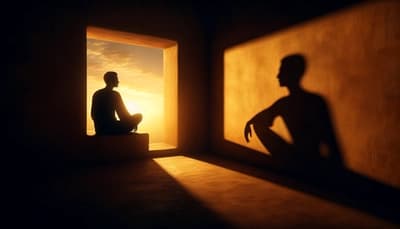Wisdom & Philosophy

What Death Reveals About Self — Impermanence, Resilience, and Freedom
Modern life rarely leaves space to consider death — yet its presence quietly shapes how we value time, identity, and change. Reflecting on what death reveals about self can unlock resilience and a gentler acceptance of life’s shifting nature. Here’s how to approach this uncomfortable subject, not as an end point but as an invitation

Becoming Ego-Aware: Honoring the Self Without Getting Lost Inside It
What does it mean to become ego-aware? So often, we hear about “letting go of ego” or fighting the wounded self within. But is it possible to meet the ego not as an enemy, but as a messenger on the path to healing and spiritual growth?

Western and Eastern Mind: Two Ways of Meeting the Present
There is a stillness that gently sits beneath thinking, untouched by whether it is west or east. The mind, with its questions, wanders down many paths. Here we pause, letting the voices of Western and Eastern traditions drift nearby, not to choose sides, but to notice what is always right here.

Karma and Dharma: What’s the Difference and Why Does It Matter?
When the world feels uncertain, it’s natural to wonder if our lives are guided by destiny or by choice. The ancient teachings of karma and dharma invite us to listen closely to both our actions and our inner callings.

Truth as Your Inner Compass: Building Character in Everyday Life
There are days when your decisions swirl with doubt, and your center feels far away. Truth as an inner compass isn’t about having all the answers—it’s about trusting the quiet, steady guide beneath the clamor.

How to Walk the Middle Path: Non-Reactivity and the Quiet Power of Right Action
Maybe you’ve wondered what it means, in a swirling world of extremes, to “walk the middle path.” Is it plain compromise, indecision, or quiet wisdom in action? The notion of walking the middle path—so central to Buddhist practice—offers gentle strength, connects deeply with the power of non-reactivity, and roots us in the moral principles of awakened living.
